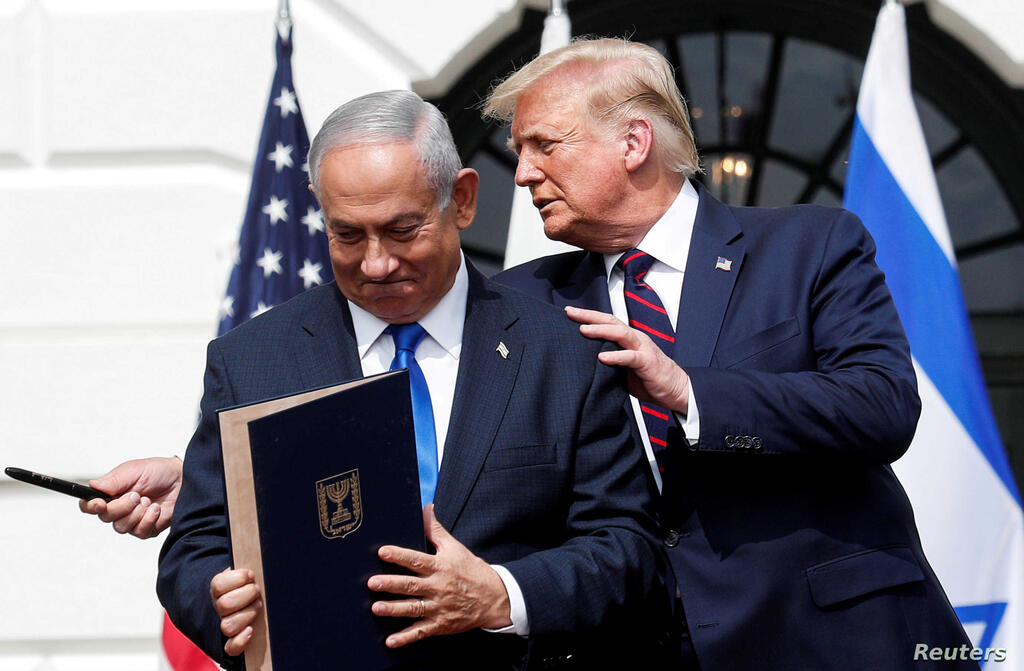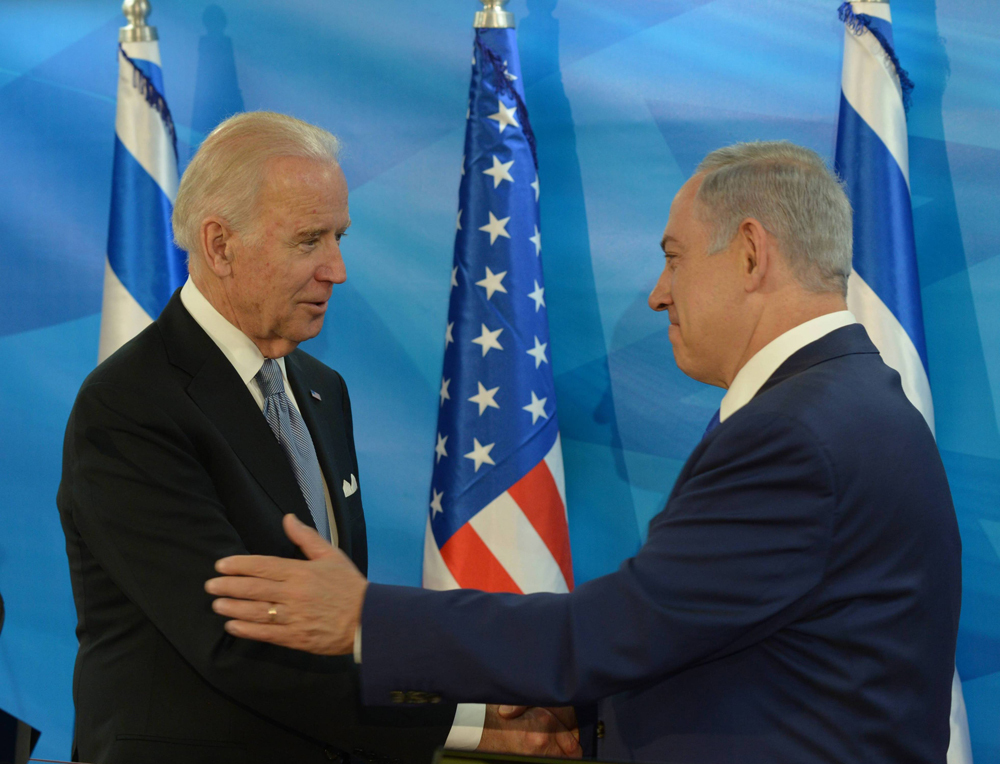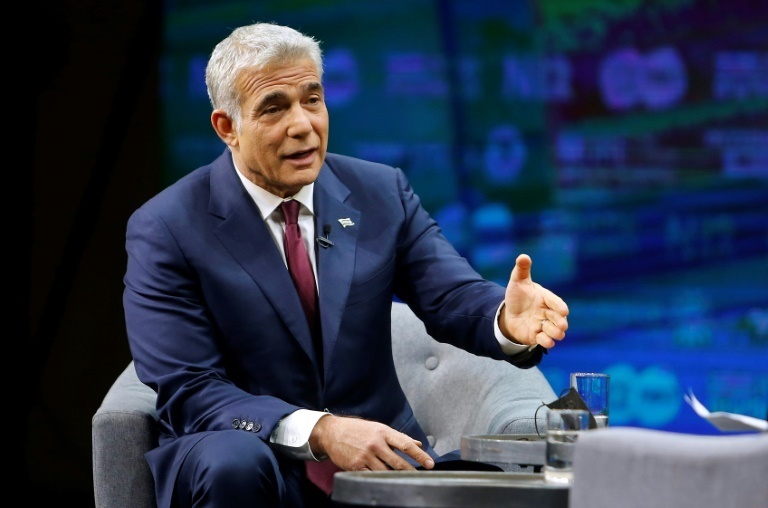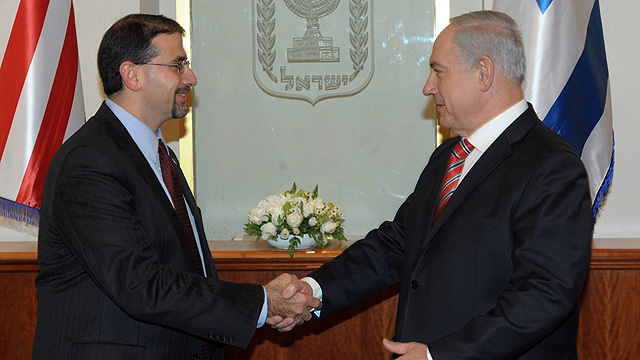Getting your Trinity Audio player ready...
As Prime Minister Benjamin Netanyahu faces a re-election battle next week, he's missing an ally he could rely on during three previous votes over the past two years: Donald Trump.
The former president's conservative base was avidly pro-Israel and Trump fulfilled a wish list for the hawkish Netanyahu.
6 View gallery


Prime Minister Benjamin Netanyahu stands with then-U.S. President Donald Trump after signing the Abraham Accords at the White House, Sept. 2020
(Photo: Reuters)
Trump recognized Jerusalem as Israel's capital, blessed settlements in the West Bank and doled out U.S. incentives for Arab nations to normalize ties with the Jewish state.
Netanyahu cited his closeness with Trump to bolster his candidacy, printing the former president's face on his posters during past campaigns.
The prime minister "actually said to his followers: See, whenever I want, I knock on the door of the White House and the White House opens the door," says Tamar Hermann, a political scientist at the Open University of Israel.
6 View gallery


A Likud election poster touts Benjamin Netanyahu's close ties to former president Donald Trump. The caption reads: Netanyahu, a different league
(Photo: EPA)
U.S. President Joe Biden represents a dramatically different political reality for Netanyahu, who is seeking to extend his record 12 consecutive years in power on March 23.
In this vote, "the presence of the American administration is minimal," Hermann said.
'No alternatives?'
Netanyahu and Biden have both affirmed a decades-long friendship, but they have sharp policy differences, especially concerning Iran.
Biden has sought a return to the 2015 Iran nuclear deal, an agreement loathed by Netanyahu which Trump had scrapped.
The Democratic president is also expected to renew U.S. criticism of Israel's settlement expansion in the West Bank.
6 View gallery


Then-U.S. VP Joe Biden meeting with Netanyahu during a visit to Israel in 2016
(Photo: GPO)
"There's no love for Netanyahu in this administration and among Democratic elites," said Shibley Telhami, an expert on U.S. policy in the Middle East at the University of Maryland.
"The problem for them right now is that the practical alternatives to him are almost equally bad."
Several of Netanyahu's former allies have joined rival right-wing parties.
Polls show none of those new factions is likely to beat Netanyahu's Likud, but they have shifted Israeli politics further to the right.
Biden's ideology may align most closely with the centrist Yesh Atid party led by Yair Lapid, which is predicted to finish second behind Likud.
Veteran U.S. Democratic political consultant Mark Mellman, who is advising the challenger, says Lapid shares Biden's values and counts the president as a friend.
"Biden is for a two-state solution. There are parties running in Israel that are opposed to a two-state solution," Mellman says.
Still, "there's nothing that [Biden] has done that suggests that he wants to play a favorite here at all."
David Makovsky, a senior fellow at the pro-Israel Washington Institute for Near East Policy, says even if Biden wanted to back a Netanyahu rival, any alternative coalition could face collapse under ideological divisions.
"They agree they want to get rid of Netanyahu. That gets them through the first month, but what do they agree on after that?" says Makovsky.
Moreover, he says, the Biden administration's attention is elsewhere.
"The administration has got a lot on its plate with COVID, COVID, COVID, 500,000 Americans killed, all the economic implications of Covid, and it's just crowding out a lot of issues," he says.
'Not Mideast focused'
Biden has signaled he will not reverse some of Trump's moves that were popular in Israel.
He does not intend to return the U.S. embassy to Tel Aviv and his administration supports the Trump-brokered agreements that saw Israel normalize ties with the United Arab Emirates, Bahrain, Morocco and Sudan.
Washington's criticism of an International Criminal Court probe into alleged Israeli war crimes in the West Bank and Gaza was also welcomed across the Israeli political spectrum.
"The U.S. is going to work with whoever emerges," says Dan Shapiro, who served as Barack Obama's ambassador to Israel.
"But the broader picture is that President Biden's overriding priorities right now are generally not Middle East focused."
Rather than aim for a comprehensive peace deal, Biden will focus on improving daily life for Palestinians by restoring aid and renewing diplomatic missions, which Trump cut off, Shapiro predicted.
Domestically, Biden faces only limited calls from progressives to advocate harder for the Palestinian cause.
6 View gallery


A Palestinian laborer is vaccinated against coronavirus at an Israeli pop-up clinic in the West Bank
(Photo: AP)
Last week Vermont Senator Bernie Sanders and four Democratic senators asked Secretary of State Tony Blinken to pressure Israel to do more to help Palestinians get coronavirus vaccines.
Israel is the world leader in vaccinations per capita, but has only offered a limited quantity of doses to the Palestinians, who have yet to launch large-scale inoculations in the West Bank or the jointly Egyptian and Israeli-blockaded Gaza.



